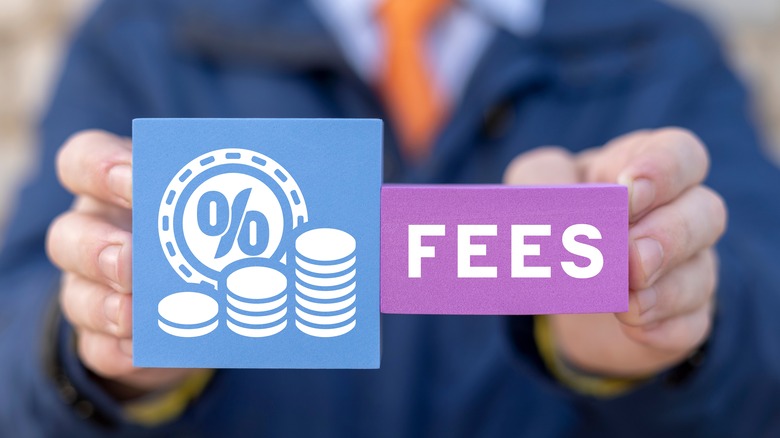Ideas To Pay Off Your Mortgage Early
There are many great things about owning a home, free and clear. According to Credible, the main benefit is easy to predict housing costs. Once your mortgage is gone, you have a place to live forever. Bills like property taxes, utilities, and even homeowners insurance are often nominal when compared against mortgage principal and interest payments. You also have the benefit of owning something that tends to appreciate in value each year. In addition, having 100 percent equity in an asset can be a great source of leverage when overcoming personal debts or starting your own business.
If you don't have a mortgage anymore, there are no limits to how you can use the extra money. You can save more to enjoy a lavish retirement, buy a boat, beef up your dream vacation fund, or pay cash for your children's education. If you want to pay off a mortgage early, here are some top tips to help you achieve this goal.
Make sure there isn't a penalty for paying your loan early
Mortgage lenders make their money from your interest payments. When you sign up for a traditional 15 or 30-year mortgage, most lenders are really counting on your interest payments for every one of those years, so their business can profit. If you want to pay your mortgage early, lenders get less interest and therefore less money in the long run. Some loan agreements attach an early payoff fee to their home loans to avoid this loss.
According to Rocket Mortgage, most prepayment fees are not from occasional extra payments or one larger lump sum payment. That is, as long as the payments are not more than 20 percent of the loan. Most mortgages allow you to pay up to 20 percent of the loan off each year. If you are inching towards the 20 percent mark, speak to your lender, or review your loan paperwork, to discover your fee. All lenders are different, so some might charge a fixed repayment fee, while others might charge a percentage based on the amount of loan left.
Refinance your mortgage
If you are currently on a 30-year term, you might want to move it to 15 years to pay more of the principal each month and less interest overall. According to Bankrate, when you refinance your mortgage, you get a completely new home loan. Sometimes, you might refinance your loan to get a lower interest rate than you originally signed up for. In other instances, you might shorten the length of your loan because your finances have changed, and you can pay more each month.
However, refinancing doesn't come without upfront costs. So, before you decide to refinance your mortgage, take a look at the entire home loan. Speak with your lender or financial advisor and crunch the numbers. Would making extra payments on your current loan accomplish the same goal? Think things through. You always want to pick the option that saves you the most money, both now and in the long term.
Make one lump sum payment
If you recently received a significant payout, you can choose to put it all toward your mortgage. Maybe a family member passed away and left you a lump sum, perhaps you received an insurance payout, or maybe you just had a lucky day at the casino. According to Commerce Bank, you can send your mortgage lender a large check on top of your monthly payments if you don't need the cash for your monthly budget and other bills.
You will need to specify that the funds go toward the principal loan and not just act as a credit on your account. This way, your lender doesn't think you are just prepaying for upcoming debits. Each lender has its own way of designating these "principal only" loan payments, so before writing a check and sending it on its way, confirm with your lender about their specific practices. It's always good to double check these things.
Make extra payments periodically
You don't have to make one lump sum payment or even pay extra every month. Sometimes, you might have a little extra money left over at the end of the month. Why not put that cash toward your mortgage? According to the Mortgage Calculator, just making one extra payment a quarter can take thousands in interest off the course of your loan. You can use the online mortgage calculator tool to see how much impact your smaller payments can make over time.
One of the most popular ways for homeowners to pay their mortgages off early with smaller extra payments is the biweekly method. To participate, you allow your mortgage company to direct debit your account every two weeks instead of twice a month. Due to months with irregular lengths, this method accounts for an extra month's payment each year, with hardly any extra work for you.
Invest your extra money
According to Investopedia, deciding whether to invest extra cash or use it to pay off your mortgage can be a tricky question. While it's always best to consult a financial advisor about your unique situation, interest rates on a mortgage are anywhere from 3 to 6 percent typically. In addition, returns on investments can average out to about 10 percent per year (via NerdWallet). Since a mortgage term is usually 15 to 30 years, you might consider investing any extra cash you have each month into an ETF or mutual fund with moderate risk.
Leave the money there and let it grow over ten years or so, then use the cash to pay off your home loan. However, while it is essential to remember that investing your money often leads to higher returns than simply leaving it in a high-yield savings account or putting it towards your mortgage upfront, it also comes with a higher risk. There is always the possibility that the money could lose value instead of growing.
Consider downsizing your home
If you want to be mortgage free, consider selling your current home and using the cash to purchase a smaller home or a place in a less expensive area. According to Keller Williams Realty San Antonio, there are a few telltale signs it is time to downsize your home. First, look around your home. Do you have unused rooms? Perhaps a child left for college, or you intended to turn a bedroom into a home office but stopped working remotely. If you are using all the space you have, think about the maintenance of your home. Does it have a pool or large yard you are tired of taking care of? Selling and moving to a smaller place can immediately ease the maintenance burden.
Another reason for selling your home and moving to a smaller one is finding yourself becoming house poor. Being house-poor means that you can technically afford your mortgage each month, but it eats away your income, so other areas of your life suffer as a result (via Bankrate). If you can't live the lifestyle you want because you are overwhelmed by your mortgage payments, do yourself a favor and move to a smaller place or less expensive area.
Renegotiate your salary
If you're making more money each month, you can pay more towards your mortgage. According to Indeed, while most people may dread asking for a raise, it doesn't have to be as bad as you think. The key to succeeding in the conversation is to remain respectful and focus on the facts. Experts agree that you should approach the matter calmly and sometimes even casually. Start by asking your direct manager for a quick meeting to discuss your role at the company. This way, you can speak with no distractions.
When attending the meeting, bring evidence of the positive role you add to the company. Have you enrolled more new clients over the past few months? Have you created a new system that improves everyone's workflow? In addition, it's a good idea to look into what others in similar roles are making at other companies. Remember to schedule the meeting at a good time, and don't expect to leave with an answer. Often, managers must speak with their bosses, too, or check in with human resources. If your company refuses your request, consider other backup requests like flexible start times, working remotely, or promotions. You can also consider looking for alternative work and negotiating a higher salary from the beginning.
Reduce going out to eat
Small extra payments, especially at the beginning of your home loan, can make a significant impact. As frustrating as it might be, telling yourself you have food at home instead of eating out at restaurants can help you find extra cash in your budget each month to pay off your loan early. According to SoFi, restaurants typically charge up to a 300 percent markup on their meals. If you cook the same thing at home, you lose the convenience of a restaurant, but you make instant savings. Another benefit of eating at home is that it is often healthier than eating out.
If you don't want to stop eating out altogether, consider cutting back and using the difference to pay off your debt. For example, if you typically have a glass of wine or a cocktail with dinner, choosing water or a soda can save you $20, depending on local prices. If you typically eat out twice a week, you can save $40 a week, or $2,080 a year, toward your mortgage. For some loans, that would be like paying a whole extra month.
Sell old clothing for extra cash
You can sell your own clothes or clothes you find at a local thrift store, then put the extra cash toward your house debt. Reselling clothes can actually be a lucrative business. However, do your research first if you want to be successful. "Do research on how to authenticate these items. It's really important, especially if you're dealing with something that has a lot of replicas," Adam Ezzell, who has been reselling clothes full time since 2015, told Complex. "I have friends who do similar things to me who make hundreds of thousands of dollars a year. If you're buying the right items and selling for the right amount of money, making $100 a day is very possible."
Study clothes on resale websites to understand what is popular and how to price specific brands. Once you master that, the sky's the limit on your cash flow. If you spend your weekends doing this, that's $200 a week towards your mortgage. An extra $10,400 a year is not too shabby! Alternatively, think about organizing a neighborhood garage sale to sell your old belongings.
Invite more pets into your home
If you are an animal lover, there is an easy way to put extra cash toward your mortgage each month. You can start watching over dogs, cats, and other pets while their owners are on vacation. According to The Broke Generation, you can set up a pet-sitting business in several ways. There are multiple companies where you can create a profile and do all of your business through the platform, such as Rover. This way, you don't need to search for clients by yourself. You can also ensure that everything is safe and secure. The platform will screen you and the clients before you can use it. Typically, these platforms also handle the payment process. However, the company will take a small fee for connecting owners and pet sitters to each other.
Alternatively, you can set up your own pet sitting business and operate independently from these platforms. If this is the case, you should consider taking out liability insurance, just in case anything happens to the pets or the client's home when you are looking after them. You can find clients on social media, through word of mouth, or even by setting up your own website. Then, take your profits and put them toward your house payment.
Cancel your subscriptions
Monthly subscription packages really can make life easier. You can purchase something like DashPass, which waives most delivery fees on your late-night snack cravings for a small monthly fee. If you sign up for Fabletics, you can get a credit each month to purchase workout gear. The same goes for Amazon's Audible, but with books. When you consider other entertainment options like Spotify, Disney+, and Netflix, the direct debits start adding up fast.
If you are searching for more cash in your budget to put toward your mortgage each month, cutting these services can sometimes be the best place to start. For most of us, we might not even be able to remember all of our subscriptions until they bill us each month. Even worse, we can sign up for a free trial and forget to cancel it in time. According to PCMag, there are a few software tools that consumers can use to keep track of all of their subscriptions, so they can better manage their money. Mint is one example. Once you have loaded all of your subscriptions into your app of choice, cancel the ones you haven't used in a while and downgrade the ones you use less frequently. Then, reserve that money for your extra mortgage payments.
Reupholster furniture or fix up other items
A couple on TikTok spends their spare time fixing up old couches and putting the cash toward their home loan. According to The Sun, TikTokers Grace and Creighton usually purchase the falling apart furniture on sites like Craigslist or Facebook Marketplace. Sometimes the items are in such bad shape they are given away for free. From there, the couple puts in hours of work cleaning each cushion, arm, and leg. It's a painstaking process, but they don't always do it all by hand.
"We tried to clean it by hand and that was just not gonna work, so we stripped the [cushions], threw them in the washer and while that was cleaning I went to work on the rest of the sofa," Grace told The Sun. "It's something Creighton and I can enjoy together. The income is for *extra* payments on our mortgage so we are ok with not making huge profits sometimes." Once they've gotten rid of the dirt, grime, and pet hair, they put the couch back up on resale sites to reap the profits. However, it's fine if fixing up couches isn't your skill set. Lean into what you enjoy and see if you can make money from one of your hobbies.
Take surveys in your spare time
To earn extra cash to put toward your home loan, you can take on a side hustle even if you don't have a lucrative skill or hobby. You can easily turn extra time into money. For example, you can sign up to be a mystery shopper and take surveys for a small amount of money. According to Career Karma, dozens of websites offer paid surveys to the public. Companies pay these websites a larger fee, usually a few thousand dollars, to get their product in front of as many eyes as possible.
As a consumer, you are responsible for rating the product and answering questions about your habits and behaviors. As a small thank you for your time, you can be paid anywhere from $.50 to $5.00 for each survey. While small, these bits of cash can add up to overall lower interest payments over time. Take note that sometimes survey websites pay in gift cards. While you cannot pay your mortgage with a gift card, you can use them to pay for everyday expenses and then put that cash toward your loan instead.













